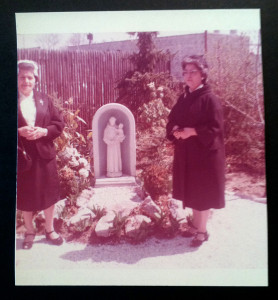It’s way past midnight. Past one, even. I’ve been thinking to myself, “St. Anthony won’t mind so much if I skip writing about him this year,” and that’s probably true, but then I began hearing the voice of my grandma, Assunta. If I wasn’t eating my stewed prunes or if I was being stubborn about cleaning up my room or something like that, she would come up to me and say, “Come on, Johnny. Do for Grandma.” St. Anthony was Grandma’s favorite saint, and by the 13th of June, his feast day, she would have been offering prayers to him for thirteen days straight. There’s devotion for you, and an example to follow if ever there was one. And so this late night, when the clock is telling me it is already well into the 13th of June, I will––super quick––write to you about St. Anthony’s Day. I “do for Grandma” (and for you, too).
St. Anthony of Padua is a familiar figure. He was born in Lisbon in the late 12th century, but he spent most of his life in Italy, in Padua especially. He was an early follower of St. Francis, and as a Franciscan, he wore the iconic brown cowled habit with a tonsured haircut that left the crown of his head bare, a clear portal, perhaps, from head to heaven. He is a populist saint, and is called upon for many reasons, but he is best known as the saint who helps you find lost articles. And so when we misplace our glasses or our keys, we say Tony Tony come around, something’s lost and must be found, an old children’s rhyme. And more often than not, it works. Perhaps because of that populism that surrounds him. He died in Padua in 1231 and was canonized soon after. Some of the miracles attributed to him: a donkey knelt before him. And he preached to the fishes––the people weren’t listening to him but they did once they saw the fishes listening. And just before he died, he was seen in ecstasy holding the baby Jesus in his arms. This is the image we see most often depicted in all those statues in front of Italian American homes. He’s a presence we Italians like to talk to, like an old paisano. Grandma certainly did. I do, too. And who knows, maybe you will, too, the next time you misplace your keys or your wallet or those pesky reading glasses, and there’s no harm in that. We need all the help we can get.
Image: Grandma with our backyard statue of St. Anthony, before Dad painted it. Grandma is on the left, and nearby is one of any number of her friends, all Italian, and all of whom were referred to as “Cummara”.
